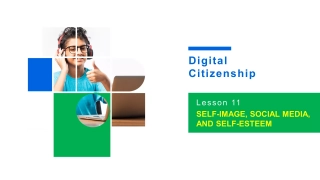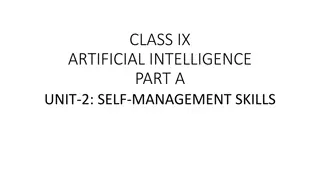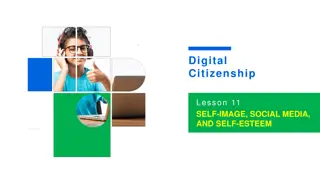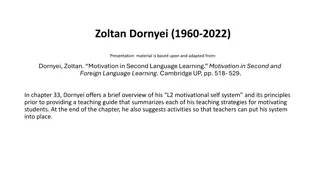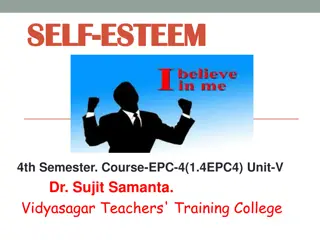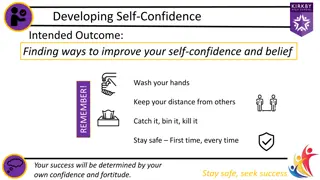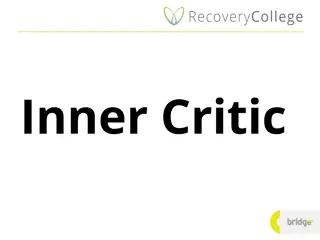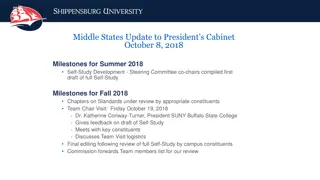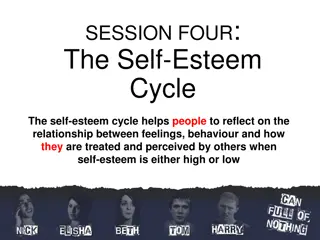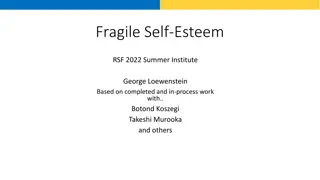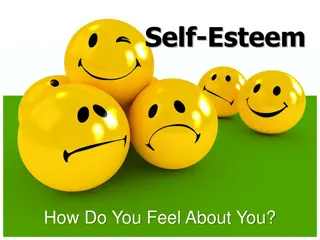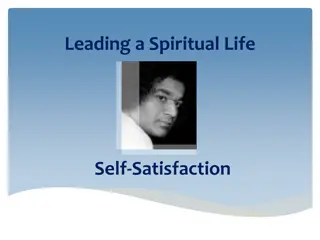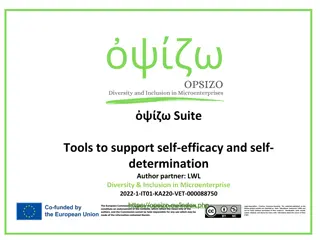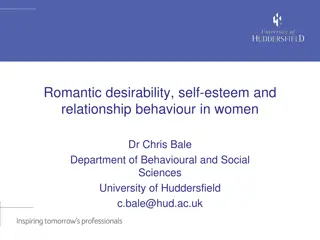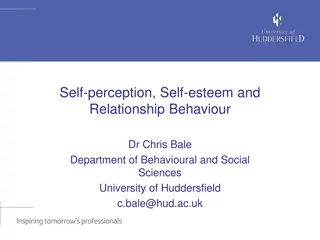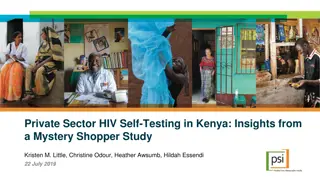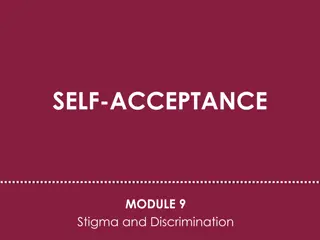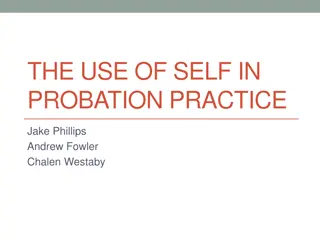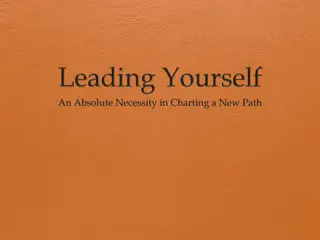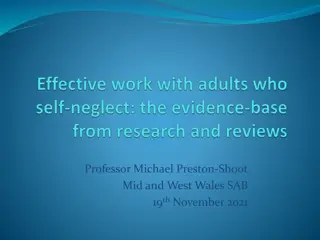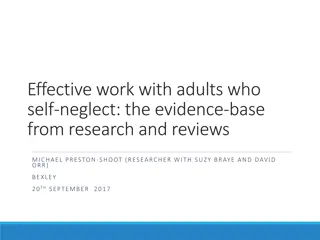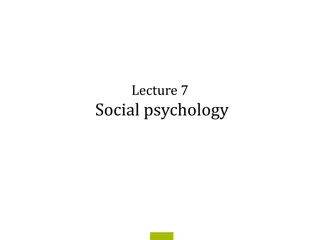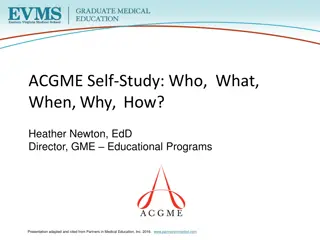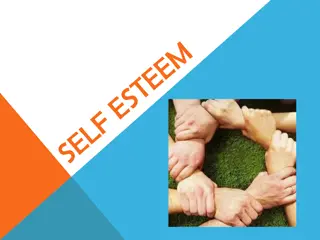Digital Citizenship: Self-Image, Social Media, and Self-Esteem
Explore the impact of social media on self-image and self-esteem. Learn about the influence of filters and media on body perception. Reflect on self-assessment and take-home activities to improve self-confidence.
3 views • 11 slides
Enhancing Self-Management Skills for Personal Growth
Self-management skills are essential for regulating emotions, thoughts, and behaviors effectively. Understanding yourself, setting goals, and developing positive habits contribute to self-improvement. Positive results of self-management include proactivity, goal setting, and self-reinforcement. Stre
1 views • 9 slides
Understanding Self-Worth in Children: Building a Strong Foundation
Explore the importance of self-concept, self-esteem, and self-worth in children's development. Learn how parents can positively impact a child's self-perception and self-value through nurturing experiences. Discover the key sources influencing children's self-worth and the critical role of early lif
0 views • 30 slides
Understanding the Impact of Social Media on Self-Image and Self-Esteem
Explore the story of Tara, a 13-year-old girl whose experience with social media shapes her self-image and self-esteem. Delve into how social media can influence our perceptions of ourselves and others, affecting mental well-being and relationships. Understand the role of digital citizenship in navi
10 views • 11 slides
Self-Advocacy, Communication, and Research
Explore the essence of self-advocacy, communication, and research in this training module. Learn to articulate your needs effectively, acquire self-advocacy skills, and identify various settings where self-advocacy is crucial. Engage in activities to assess your self-advocacy skills and reflect on h
2 views • 35 slides
Enhancing Language Learning Motivation: Insights from Zoltan Dornyei's L2 Motivational Self System
Zoltan Dornyei's L2 Motivational Self System emphasizes the dynamic interplay of motivation, cognitive, and emotional factors in language learning. By addressing students' ideal self, ought-to self, and learning environment, this approach facilitates creating, generating, maintaining, and encouragin
0 views • 13 slides
Understanding Self-Esteem: Meaning, Importance, and Types
Self-esteem is how we perceive our worth and value. High self-esteem leads to confidence and positivity, while low self-esteem can result in self-doubt and negative emotions. Self-esteem impacts mental health, behavior, decisions, relationships, and overall success in life. Recognizing and nurturing
2 views • 15 slides
Understanding Self-Esteem and Ways to Improve It
Self-esteem is our perception of ourselves, impacting how we navigate life. Healthy self-esteem fosters positivity, while low self-esteem can be detrimental. Various factors, like childhood experiences, contribute to low self-esteem, but steps can be taken to improve it. Building positive relationsh
0 views • 14 slides
Understanding the Self: Psychology's Focus and Implications
The field of psychology has long been intrigued by the concept of self, exploring its importance to well-being, self-esteem, and brain localization. Research reveals how excessive optimism, self-bias, and blindness to incompetence can impact self-esteem. Contrasting individualist and collectivist cu
1 views • 41 slides
Building Self-Confidence: Key Steps and Benefits
Understanding self-confidence, its importance, and how to develop it can lead to enhanced resilience, motivation, reduced fear and anxiety, and a stronger sense of self. Self-confidence allows for confident behavior, while lack of it can lead to self-doubt and avoidance of risks. Learning to embrace
0 views • 7 slides
The Importance of Self-Awareness in Personal Growth
Self-awareness is crucial for understanding one's character, feelings, and motivations. It helps in recognizing strengths and weaknesses, managing stress, improving communication, and fostering empathy. Developing self-awareness involves introspection, mindfulness, self-reflection, and seeking feedb
2 views • 47 slides
Understanding Your Inner Critic and Building Self-Compassion
Explore the concept of the Inner Critic, its impact on self-perception, and practical strategies to develop self-compassion. Learn to identify critical self-talk, differentiate between the inner critic and your true self, and cultivate a positive internal dialogue to counter negativity effectively.
0 views • 9 slides
Developing a Self-Care Action Plan for Overall Well-Being
Self-care involves deliberate activities to nurture mental, emotional, physical, and spiritual health, yet it is often neglected. This guide explores the essence of self-care, emphasizes the importance of building a personalized self-care action plan, and provides insights into taking care of your b
0 views • 19 slides
Enhancing Self-Confidence for Professional Success
Understanding the importance of self-confidence in the workplace is crucial for personal growth and career advancement. Self-confident individuals trust their abilities, maintain a sense of control over their lives, and have realistic expectations. This summary delves into the characteristics of sel
0 views • 13 slides
Middle States Commission on Higher Education Self-Study Process
The Middle States Commission on Higher Education's self-study process involves organizing the study of institutional mission, goals, and objectives through working groups, drafting the self-study report, receiving feedback, and preparing the final report for accreditation. The mission is to ensure e
1 views • 8 slides
Understanding the Self-Esteem Cycle: High vs Low Self-Esteem
The self-esteem cycle explores the interplay between one's feelings, behavior, and how they are treated based on their self-esteem level. High self-esteem is associated with positive feelings, supportive behavior, and positive interactions, while low self-esteem manifests in negative emotions, withd
9 views • 4 slides
Fragile Self-Esteem: Exploring Connections Between Psychology and Economics
Fragile self-esteem is a common but complex phenomenon that impacts individuals' emotions and behaviors. This paper delves into the interplay between psychology and economics to understand the implications of high-but-fragile self-esteem, especially in terms of insecurity and narcissistic traits. Dr
0 views • 27 slides
Enhancing Self-Regulation for Formative Assessment through Social and Emotional Learning
Explore the significance of self-regulation in formative assessment, understand key concepts like self-control, emotional competence, and perseverance. Discover actionable strategies to implement self-regulation interventions with students and train other adults effectively. Future orientation and s
0 views • 25 slides
Understanding Mindful Self-Judgment and Its Role in Mental Health
Mindful self-judgment is a complex concept that involves balancing self-awareness and self-compassion. While nonjudgment is a key aspect of mindfulness practices, there is a debate on whether mindful self-judgment can be appropriate and functional in certain circumstances. Researchers like June Pric
2 views • 46 slides
Prioritizing Self-Management of Long-Term Conditions in England
Qualitative investigation into NHS commissioners' perspectives on self-management of LTCs reveals important outcomes and priorities. The study explores how commissioners conceptualize self-management, identify valued outcomes, and assess support services to enhance patient care. Through semi-structu
0 views • 19 slides
Impact of Shadow Boxing and Pad Work Training on Self-Confidence of Muay Thai Participants
Muay Thai participants at Revolt Gym engage in shadow boxing and pad work training to enhance their skills and build self-confidence. Self-confidence in sports is crucial for success, and these training methods play a significant role in developing mental and physical capacities. The study investiga
3 views • 8 slides
Understanding Self-Esteem: Highs and Lows
Self-esteem is the judgment we hold about ourselves, shaped by experiences and relationships. High self-esteem individuals embrace new encounters with confidence and positivity, while low self-esteem individuals struggle with self-doubt and criticism. Recognizing signs of low self-esteem is crucial
0 views • 11 slides
Exploring Self-Sacrifice in Spirituality with Study Circle Agenda
Delve into the essence of self-sacrifice through a spiritual lens in a study circle setting. Explore the true meaning of self-sacrifice, learn to embody it in daily life, and discover how self-confidence and satisfaction connect to this virtue. Engage in activities, discussions, and meditations focu
0 views • 28 slides
Delving Deeper into Self-Satisfaction: A Spiritual Study Circle
Explore the concept of self-satisfaction in a spiritual context through a study circle focusing on understanding its meaning, experiencing it in daily life, and its role in self-realization. The session includes meditation, discussions on different aspects of self-satisfaction, and reflections on ac
0 views • 22 slides
Enhancing Self-Regulation Skills in Children: Strategies and Tips
Understanding and fostering self-regulation in children is crucial for their development. Self-regulation involves controlling impulses, focusing, and shifting between tasks. This article delves into the internal mechanisms of self-regulation, such as executive function, and provides practical tips
1 views • 22 slides
Boosting Your Child's Self-Esteem & Confidence in Parenting Workshop Series
Understanding self-esteem in children is crucial for their emotional development. Healthy self-esteem leads to positive behaviors, while low self-esteem can result in negative self-perceptions. Recognizing signs of healthy and unhealthy self-esteem allows parents to support and nurture their child's
0 views • 11 slides
Enhancing Academic Accreditation Process: Onsite Visit and Self-Study Analysis
The e-workshop sessions focus on preparing external reviewers, analyzing self-study documents, and understanding the purpose of onsite visits in academic accreditation. Topics covered include self-study definition, evaluating weaknesses identified by reviewers, and the importance of the onsite visit
0 views • 16 slides
Enhancing Self-Efficacy and Self-Determination in the Workplace
Establishing high levels of self-efficacy and self-determination in the workplace is crucial for accomplishing tasks and goals effectively. This publication explores the significance of these traits, providing strategies for managers to foster and maintain them. Discover why self-efficacy and self-d
0 views • 8 slides
Women's Self-Esteem and Relationship Behavior Study: Insights and Implications
This study explores the relationship between women's self-esteem, relational behavior, and perceptions of relational desirability. Findings indicate that self-esteem does not significantly predict relational behavior, with women feeling less desirable than their partners reported investing more in r
0 views • 9 slides
Understanding Self-Perception, Self-Esteem, and Relationship Behavior
The discussion explores the impact of low self-esteem on various psychological issues, societal views on self-worth, self-perception biases, and the consequences of self-esteem in different aspects of life, backed by research and theories such as the Better-Than-Average Effect and Sociometer Theory.
0 views • 19 slides
Insights into Private Sector HIV Self-Testing in Kenya
A mystery shopper study was conducted to assess the private sector's effectiveness in providing high-quality HIV self-testing services to adolescents and young people in Kenya. The study focused on pharmacies and private health facilities participating in an HIV self-testing demonstration project. M
0 views • 25 slides
Understanding Self-Acceptance and Overcoming Stigma
Self-esteem and self-acceptance are distinct concepts, with self-acceptance focusing on embracing all facets of oneself unconditionally. Developing self-acceptance involves stages like aversion, curiosity, tolerance, and allowing. Overcoming avoidance and resistance can lead to self-compassion and g
0 views • 10 slides
The Use of Self in Probation Practice: Understanding Self-Disclosure and Its Implications
Explore the concept of self-disclosure in probation practice, examining different methods, findings, and implications. Discover the two schools of thought regarding self-disclosure and delve into the various realms and subtypes of self-disclosure practices. Gain insights into the forms of self-discl
0 views • 25 slides
Understanding Leadership and Self-Leadership for Personal Development
Leadership is defined as an influence relationship between leaders and followers striving for real change. It involves self-awareness, self-management, and self-development. Self-leadership begins with understanding oneself, motives, and capabilities through self-awareness, ultimately leading to pur
0 views • 42 slides
Understanding Adult Self-Neglect: Evidence-Based Practices and National Analysis
The evidence base for working with adults who self-neglect reveals key insights from safeguarding adult reviews, emphasizing the prevalence of self-neglect as a form of abuse or neglect. Case reviews highlight system failures and areas for improvement, such as legal literacy and coordination shortco
0 views • 26 slides
Understanding Self-Neglect in Adults: Challenges and Research Insights
This content delves into the complex issue of self-neglect in adults, covering its definition, key challenges, and the research evidence available. It explores the various aspects of self-neglect, including neglect of self-care, domestic environment, and refusal of services. The challenges associate
0 views • 39 slides
Understanding the Self in Social Psychology
Delve into the concept of the individual and the self in social psychology, exploring how identities have evolved historically and the distinction between collective and individual selves. Learn about self-awareness, Wundt's differentiation of I and me, and Higgins' self-discrepancy theory, shedding
0 views • 84 slides
ACGME Self-Study: Process, Purpose, and Implementation
Explore the rationale and process behind ACGME self-study initiatives, emphasizing improvement, community analysis, and goal-setting. Learn how to conduct a self-study, from forming committees to final submission, with a sample timeline and focus on SWOT analysis.
0 views • 21 slides
Correlation Between Self-Efficacy and Test Performance Based on International Assessment Data
Explore the correlation between self-efficacy, readiness to learn, intrinsic and extrinsic motivation with test performance using data from international assessments like PISA and PIAAC. Learn about the limitations of linear models in psychological research and the debate around self-efficacy accord
0 views • 32 slides
Boosting Self-Esteem: Benefits and Tips for Improvement
Understanding self-esteem, its benefits, and risks of low self-esteem are essential for personal growth. Developing high self-esteem can lead to increased self-respect, goal achievement, and willingness to try new things. On the other hand, low self-esteem can make individuals vulnerable to peer pre
0 views • 10 slides
